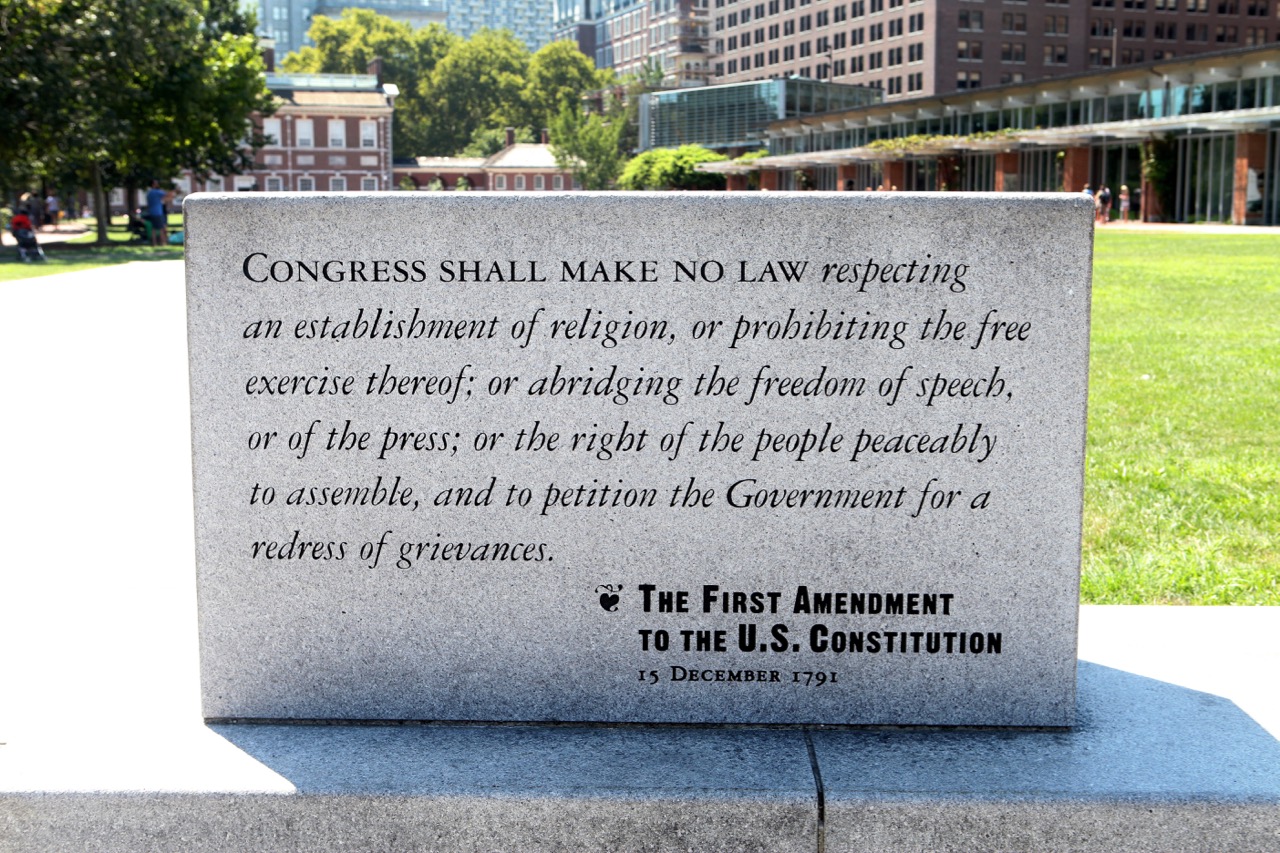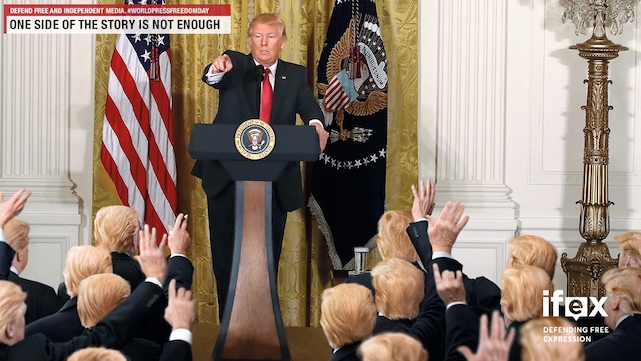The United States media - one of the best protected in the world - is facing challenges that threaten the freedom of the press. This is the finding of an unprecedented press freedom mission that took place in January 2018, one year after President Donald J. Trump's inauguration.
- Threats to media increased during the Obama administration, which brought a record number of whistleblower prosecutions.
- President Trump’s verbal attacks on the media have worsened a hostile climate to the press.
- Journalists’ ability to report is being undermined by attacks, arrests, border stops, searches of devices, prosecution of whistleblowers and restrictions on the release of public information.
- Latest report comes after US falls two places on the RSF World Press Freedom Index.
The United States media – one of the best protected in the world – is facing challenges that threaten the freedom of the press. This is the finding of an unprecedented press freedom mission that took place in January 2018, one year after President Donald J. Trump’s inauguration.
The mission’s report was published on 3 May, 2018, World Press Freedom Day. It shows that President Trump’s attacks on the media, via his Twitter account and in press conferences, are exacerbating an already hostile environment for journalists in the US.
By openly and aggressively accusing journalists and media outlets of lying and producing ‘fake news’, the current US administration risks undermining the First Amendment and creating a culture of intimidation and hostility where journalists find themselves less safe.
However, the report also identifies threats to the media that pre-date Trump. Many were present under the Obama administration, which used the Espionage Act 1917 to bring a record number of whistleblower prosecutions.
Other major threats to media freedom in the US include:
- A failure by law enforcement officials to recognize the rights of journalists to report freely on events of public interest. Journalists have been arrested and even assaulted by law enforcement officials at a local and state level, while covering protests.
- An increase in border stop and searches. Journalists have been asked to hand over electronic devices, detained or even denied entry to the US.
- A slow and unresponsive freedom of information system, which is preventing the release of information that is in the public interest.

A marble plaque with The First Amendment to the U.S. Constitution sits on Independence Mall in Philadelphia, Pennsylvania, 27 August 2016Raymond Boyd/Getty Images
Quotes from participating organisations:
Courtney Radsch, Advocacy Director, CPJ:
“The President’s hostility towards the press is trickling down to states and local communities, where officials are refusing interviews, denigrating the press, and obstructing access to information.
“This report should be a wake up call to everyone – especially those in power – to the very real threats to freedom of the press in the U.S.”
Thomas Hughes, Executive Director, ARTICLE 19:
“The alarming rise in threats to press freedom in the US over recent years must be challenged. Not only do these threats impact on freedom of expression in the US, but they have repercussions around the world.
“A free press is a vital part of democracy. The rights of US journalists must be protected so that they can continue to report freely on matters of public interest and hold the powerful to account.”
Annie Game, Executive Director, IFEX:
“Members of IFEX know from experience that efforts to control, degrade and disable a free press will always be met with great gestures of solidarity and resistance, and it will be no different in the US.”
Jodie Ginsberg, Chief Executive Officer, Index on Censorship:
“The pressures that journalists are facing in the US are reflective of the toxic atmosphere toward journalism being stoked by global leaders. Animosity toward the press is undermining the public’s right to information.”
Christophe Deloire, RSF Secretary General:
“This joint report highlights the very real threats journalists are facing in the country of the First Amendment. But what is increasingly alarming is President Trump’s constant media bashing. Trump himself is dangerous for press freedom, but the Trumpization of the treatment of journalists at the local level is equally, if not more, dangerous.”
Martha Steffens, IPI North American Chair said:
“All across the US we are feeling the effects of a relentless attack on the role of the press in our society. The constant bashing out of Washington is emboldening local officials to obstruct and interfere with the important watchdog role of the media. It is clearly an attempt to discredit the media in an attempt to divert attention from government mismanagement or wrongdoing. A great America depends on unfettered freedom of the press.”
The full report is available here.
Background
The 2018 press mission was organized by the Committee to Protect Journalists (CPJ) and IFEX, and included ARTICLE 19, Index on Censorship, International Press Institute (IPI) and Reporters Without Borders (RSF – Reporters Sans Frontières).
The mission took place between January 15-19. It included fact-finding visits to Columbia and St. Louis in Missouri, and Houston in Texas; remote interviews with journalists in Wisconsin and Illinois; and meetings with senior policymakers and national media representatives in Washington.
In April 2018, it was announced that the United States had fallen two places in Reporters Without Borders’ (RSF) 2018 World Press Freedom Index. It is now ranked 45 out of 180 countries for press freedom.
In 2017, 30 press freedom groups came together to create the US Press Freedom Tracker, which documents press violations in the US. These violations include journalists being arrested, charged, stopped at borders or having their devices seized and searched. Visit https://pressfreedomtracker.us to access this information.
